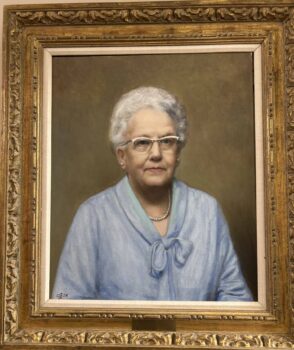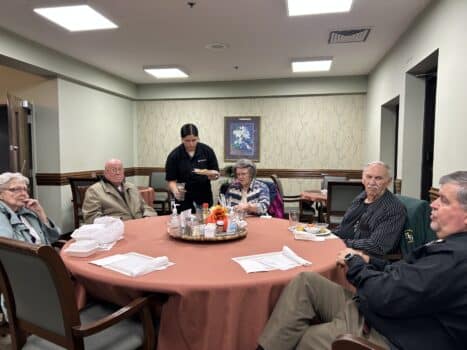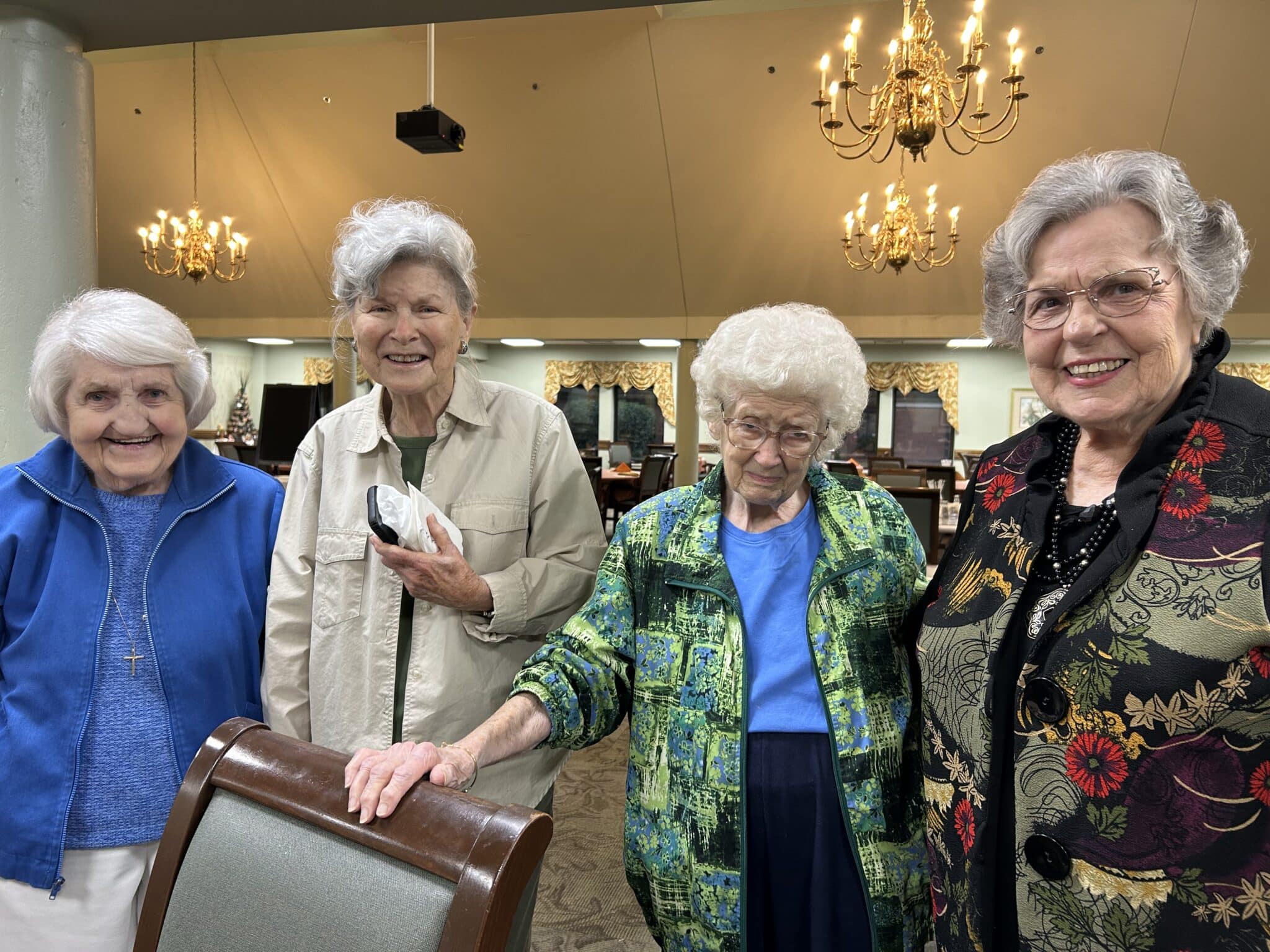The woman was dressed in light blue and wore a pearl necklace and earrings. Her glasses sat on her nose and her hair was the color of snow. Her name was Martha Franks, and she was forever posed in the painting that hung in the hallway of the Martha Franks Retirement Community, one of two (the other being Bethea Retirement Community) South Carolina Baptist Ministries of Aging (SCBMA) facilities that currently serve 350 residents.

A painting of donor, Martha Franks, adorns the wall.
Upon entrance to the facility, the road is partially covered in colorful leaves indicating that it’s fall. But the leaves aren’t the only thing changing. SCBMA leadership and the SCBaptist Executive Board are recommending two changes to their current ministry model: The sale of the Martha Franks and Bethea Retirement Communities, and a strategic refocusing of the SCBMA’s ministry model. This motion will be voted on during this year’s SCBaptist convention meeting on Nov. 10–11.
The two retirement facilities have been the means that SCBaptists have historically used to serve the elderly. According to the SCBMA website: “The underpinnings of SCBMA began in 1954 when Dr. Percy Bethea donated 146 acres in Darlington County to be developed as a retirement home for retired pastors, missionaries, ministry families and laypersons who served the Lord. Bethea Baptist Retirement Community was opened in 1960.
In 1985, Martha Franks, a retired Southern Baptist missionary to China, donated an antebellum estate in midtown Laurens, S.C., for the same purpose. The property included 50 acres with a small lake and developed into what is now known as Martha Franks Retirement Community.”
The decision to sell the properties is largely financial. According to SCBMA leadership, approximately $30-$50 million is needed over the next decade to meet the current needs of the facility and allow for future success. But the decision isn’t solely a financial one.
Tom Turner, executive director and CEO of the SCBMA, said the change isn’t just about selling the facilities but about refocusing their ministry. According to the SCBMA, the sale of the properties would allow them to repurpose assets into a lasting investment to help even more aging adults throughout the state.
A few potential opportunities from the sale could include providing grants to retired ministers and spouses and allowing them to choose where they live, expanding senior adult evangelism efforts, mobilizing seniors to serve on the mission field, and starting a senior adult ministry within the convention that equips local churches.
The decision was also not a hasty one.
Chuck Beaman, chairman of the SCBMA board of trustees, said, “The decision to sell [the] properties was made after an exhaustive search over 18 months to determine the best short- and long-term options for our residents, staff, and ministry. We, as a board, prayed for months seeking God’s will in this matter, and at the end of the day we voted unanimously to pursue a sale.”
Turner said that during the time leading up to the decision they have “devoted their efforts to studying the organization’s opportunities for improvement, sought external industry consultation, and most importantly sought God’s discernment for the organization’s future.” But he said the current business model will not be sustainable for the future.

Executive director Robert Sprouse talks with the residents after dinner.
If the SCBaptist convention doesn’t sell, then the SCBMA will “need to refinance their current $16 million of debt by summer 2026, customer costs for residential care will need to be increased, and more loans will need to be pursued, adding to the current $16 million in debt between $10-$20 million immediately and another $15-$30 million in the next 5-10 years,” according to an informational printout provided by the SCBMA.
But the decision doesn’t come without concern for the residents.
Tony Wolfe, executive director-treasurer of the SCBC, who’s walked the hallways and prayed with residents at both retirement communities, said, “It is impossible for us to separate ministry model from the real people that we’ve come to know and to love at these two campuses.”
And because of their concern for the residents, the SCBMA board said they have three criteria for choosing a buyer: one who values their Baptist heritage, has the financial strength to complete the purchase, and is committed to providing excellent care.
But Turner said that finding someone who values their Baptist heritage does not guarantee that the potential buyer will be a Christian organization. The buyer could even be a for-profit operator. If the majority votes in favor of the motion, then the decision as to who purchases the properties will be entrusted to the SCBMA board and its leaders. The SCBMA has not made any announcements about who potential buyers could be, but they said they are committed to being transparent.
What do the residents think of the potential changes?
One resident said, “I just put it in God’s hand[s] and He knows what He’s doing, because there’s nothing [that] we can do to change it. Except pray.”
Another resident, Margaret Brown, who’s been living at Martha Franks for nine years and is a member at First Baptist Laurens, said she isn’t fearful about the change because ever since the beginning when Martha Franks donated the property to SCBaptists, the place has been God- ordained. She said the community is unique because of the Christian faith that is present, and she’s confident that God will honor that faith.
“He [God] wouldn’t throw us out to the wind,” she said. “And I think He honors our faith, and then it is our responsibility to pray to God to enable the financial circumstances to work out.”
Her prayer is that the buyers would share that same faith.
“I’ve been praying that we would find people to buy who are Christians.”
She said she knows there are good people in the world who aren’t Christians, but that one who’s living a Christian life will have a different attitude and it wouldn’t just be for profit.
“I would like for the place to continue for service more than profit, which is what has been a principle through the years.”
Robert Sprouse, executive director of Martha Franks, walked the halls and dining room of the community knowing each of the resident’s names.

“Upon entrance to the facility, the road is partially covered in colorful leaves indicating that it’s fall. But the leaves aren’t the only thing changing.”
He said, “Our foundation has always been — and will always be — Jesus Christ. Long before decisions were made on paper, God has already written His plan for this place and the people who call it home. Nothing about our future is unknown to Him. Nothing about His care for us has shifted.”
Sprouse said he had to process through grief and anxiety over the potential changes but that God used a pastor on the radio to bring him comfort. One day as he rode home, the pastor reminded him that God is in control and to be still and know that He is God.
“I’ve had peace ever since then.”
Chuck Sprouse, president of the SCBaptist Convention, said, “There are times that making the best decision for our family is gut-wrenching, even when we know it is the right decision.”
SCBaptists have long cared for the aging, but it was never the properties themselves that made ministry possible. It was their faith in God behind all of it.
There are two upcoming town-hall-style meetings open to anyone interested in learning more:
- Monday, Nov. 3, 2025. 4:30–6 p.m., Cornerstone Baptist Church, Darlington, S.C.
- Tuesday, Nov. 4, 2025, 4:30–6 p.m., Welcome Baptist Church, Laurens, S.C.

